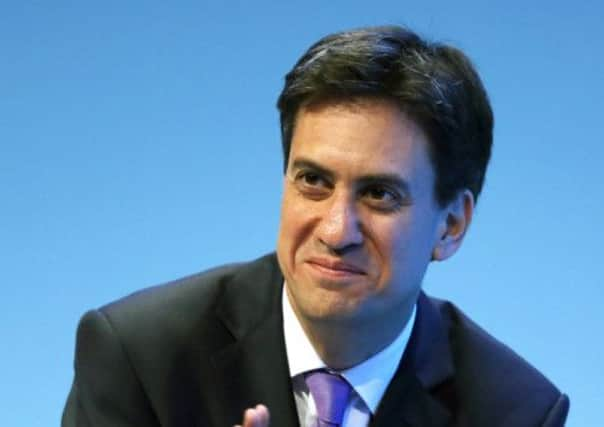Euan McColm: Miliband must clear out Unite’s old guard


Just six weeks ago, the leader of the Labour Party’s declared war on energy providers – and their ever soaring charges – caught the public mood and was beginning to change perceptions. Perhaps Miliband wasn’t weak and out-of-touch, after all. Perhaps he had both spine and gumption.
Sadly for the leader of the opposition, the dismantling of this cockamamie notion began as the crisis at the Grangemouth oil refinery and petrochemical plant flared up and threatened to cost hundreds of jobs.
Advertisement
Hide AdAdvertisement
Hide AdWith each new development in the conflict, we learned that what we’d always suspected about unions running the Labour party was the consequence of terrible underestimation. Now that the dust has settled, it’s clear that Unite – one of the party’s biggest donors – is interested entirely in using Labour for its own ends, and that Miliband, who has previously had neither the conviction nor the courage to do much about this, now has no choice but to completely transform this decades-old relationship.
His party leadership, his chances of ever becoming Prime Minister, depend now on him convincing us that he is not a union puppet. This will be a difficult task.
The catalyst for the crisis at Grangemouth was an investigation by owners Ineos into the activities of employee Stephen Deans, a Unite trade union shop steward and the chairman of the Labour’s Falkirk constituency party.
But that row and the near-catastrophe it created have been left far behind by disturbing revelations about the union’s tactics during the stand-off with managers at the plant.
Last week we learned about Unite’s use of “leverage”. This beautifully Orwellian word describes a particularly nasty practice where the homes of managers are picketed by members. There should be no place for bosses to hide, says the union, even when they are with their families.
Unite boasts of leverage as “a process whereby the Union commits resources and time to making all interested parties aware of the treatment received by Unite members at the hands of an employer”.
According to the trade union, those interested parties may include shareholders, competitors, communities within which the employer operates, customers, and the market place in which the employers works.
During the Grangemouth dispute, Unite members attended the homes of a number of managers from the plant and directors of Ineos. Interested parties, it seems, also include neighbours of managers to whom Unite has decided to devote special, unsettling attention.
Advertisement
Hide AdAdvertisement
Hide AdThis we-know-where-you-live approach to an industrial dispute included picketing some of those homes during the school holidays. According to reports (and there has been no denial of specific allegations from Unite), children living near one of the managers targeted were encouraged to join a protest. Ironically, Deans resigned from Ineos this week – in advance of a disciplinary hearing – citing, among his self-pitying reasons, pressure on his family.
Despite Unite’s insistence that its tactics were entirely legal and legitimate, leverage is clearly about intimidation. In the cases of action outside family homes, exercise of the right to protest looks awfully like breach of the peace. Unite leader Len McCluskey appears the very worst sort of militant trade unionist, the likes of whom brought Labour to its knees with industrial action in the 1970s.
Prime Minister David Cameron has said Labour must investigate the actions of Unite. He would say that, of course. But what investigation is needed when so much of what the union has done is now in the public domain? Cameron, of course, doesn’t give a fig whether Labour investigates or not. He’s simply enjoying the opportunity to draw attention to Miliband’s links with union “bully boys”.
Miliband’s response to revelations about leverage was to blandly condemn any kind of intimidatory tactics from either unions or management, the implication being that one side is as bad as the other. But one side does not appear to be as bad as the other. Unite appears to be the aggressor.
Miliband owes the support of Unite members for his leadership of the Labour Party. We can easily understand his reticence to confront fully the actions of members under McCluskey’s watch. But a confrontation is necessary. Miliband has no other options.
The Labour leader must go further than his promise to reform the relationship between his party and union members. In this instance, he should appeal directly to Unite members to take some leadership from him on how modern industrial relations must be handled. Miliband should condemn, again and again, McCluskey’s stewardship of Unite.
Wishy-washy responses of the “on-the-one-hand-this...” kind do nothing but cement the idea that the Labour leader is trade unions’ man and would, therefore, be the trade unions’ Prime Minister. We don’t need a focus group to tell us how electorally catastrophic that message would be.
Trades unions have been an integral part of the Labour Party since its formation and it is not in Miliband’s interests to break up that relationship completely. But it is in his interests to shape the way unions behave. That can’t happen while McCluskey remains at the head of Unite.
Advertisement
Hide AdAdvertisement
Hide AdThe spark which ignited the blaze that threatened to destroy Grangemouth came when Unite sought to have its preferred candidate Karie Murphy selected as candidate. McCluskey’s fingerprints are all over the near-closure of the plant. Miliband’s message to Unite members should be that their leader is focused more on his own political games than on their needs.
McCluskey has shown nothing but contempt for Miliband over the scandal in the Falkirk constituency. If Ed Miliband is to regain any political momentum, then only the departure from Unite of Len McCluskey will suffice. Now it’s down to the Labour leader to find the leverage to achieve that. «
Twitter: @euanmccolm